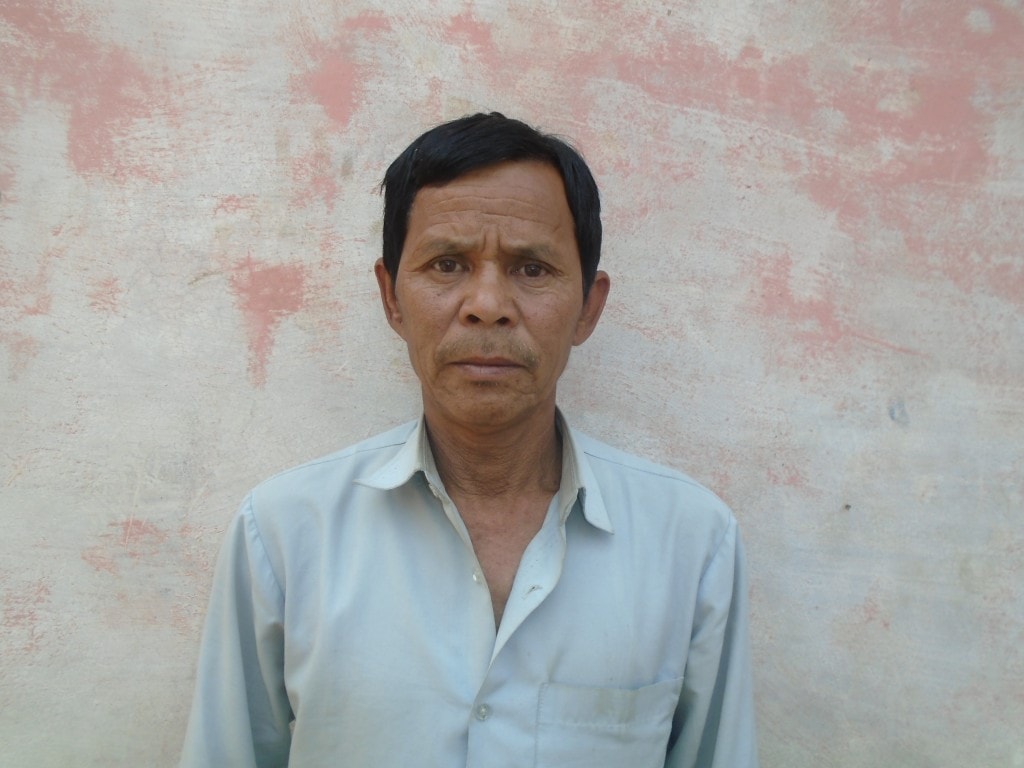Gross negligence by police, government lawyers and judges have resulted in wrongful conviction of many innocents, who are languishing in prisons across Nepal.
MUKESH POKHAREL– Centre for Investigative Journalism
Sashi Kumar Titung of Padam Pokhari, Makwanpur used to make a living selling fish and repairing bicylces. In April 20, 2012 the police arrested him from his home without clarifying the reason for his arrest. He assumed he was being charged for for selling fishes that were illegally caught by fishermen.
Sashi Kumar Titung, Padam Pokhari, Makwanpur
But the court only saw the papered evidences that the police had presented and refused to look at the person standing infront with the plea for justice. In October, 2012 Makwanpur District Court slapped a 20 years jail sentence and two hundred thousand rupees fine against Titung. He is now languishing in Bhimfedi prison.
We found sufficient evidences, Shashi Kumar’s was a case of mistaken identity, resulting from a complaint lodged by Bindiya Tamang from the same district in the case of human trafficking.
Bindya and her aunt were lured for better jobs by her husband and his friends, and sold at a brothel in India’s Mumbai in 1989. Bindiya returned to Nepal after 22 years and filed a human trafficking case against her husband Sitaram Thing, and his friends Shyam Bahadur Bomjan and a man who went by name ‘Satya’. The police began their search for three men.
Sitaram and Shyam Bahadur were arrested first, after which police nabbed Sashi Kumar Titung simply because he was called ‘Shakte’ in the village. The police clearly mistook him for adsconding ‘Satya’. They refused to listen when he tried to explain that he was not the person they were looking for.
Shakte, who could barely read or write, was made to sign three page long statement prepared by the police, and thus began the legal proceedings in which all the papers identified him as Sashi Kumar Titung aka ‘Satya’. Titung only cane to know about the charges when he was explained in the court what he was being tried for.
His plead for innocence mattered very little as all documents supported the police claim that he was indeed the absconding man ‘Satya’. The court sentenced him 20 years in prison and fined him Rs 200,000. He challenged the verdict in the Appelate Court, but the verdict was once again upheld.
His fellow villagers decried the court’s ruling and protested againt the police negligence. They even offered to find the real ‘Satya’ and bring him to the court, but one of the judges told them that the legal proceedings had already been completed.
We revisited Titung’s case files and even met the accused husband Sitaram Thing, who is also at Bhimfedi prison. ‘I told the police that they had got the wrong guy. I did not know Thitung, and he was not the guy i went to Mumbai with to sell my wife, but they refused to listen to me and framed an innocent man.’ Thing told us.
Bindiya died six months after giving statement to the court in June, 2012 in which she had explicitly stated that Sashi Kumar Titung was innocent and had no role in her trafficking.
Desperate Titung even wrote to Parliamentary Hearing Committee from the prison, pleading his innocence. He is now awaiting Supreme Court’s verdict on his petition.
Attorney General Hari Phuyal admits, Nepal’s criminal justice system needs a major overhaul. “There is something really wrong with our criminal prosecution procedure. This is evident from the fact that most of the innocents languishing in the prison are from poor and marginalised sections of the society, who were unable to prove their innocence. The rich rich and the powereful don’t seem to fall victim to such wrongful prosecution.’
‘An innocent man has been framed’
Sudarshan Lama, Village Chief of Padam Pokhari VDC (1986-89)
 When the incident happened, I was the village chief of Padam Pokhari and know Shakte very well. At the time when the woman in question was being trafficked to Mumbai, the man was present in the village. In fact, this man has never been to Mumbai, and is not the type who would be involved in human trafficking. I testified this in the court then, and still stand by what I said. An innocent person has been framed.
When the incident happened, I was the village chief of Padam Pokhari and know Shakte very well. At the time when the woman in question was being trafficked to Mumbai, the man was present in the village. In fact, this man has never been to Mumbai, and is not the type who would be involved in human trafficking. I testified this in the court then, and still stand by what I said. An innocent person has been framed.
‘The accused Satya was tall and sturdy.’
Punya Siddhi Lama, Village Social Worker and anti-trafficking campaigner,Padam Pokhari
 Our village is infamous for human trafficking and many middlemen were active here in luring young girls. I myself have helped police arrest several of them. I know, Shakte is not one of them. I have known him all my life. The man has been repairing cycles and selling fish in the village for 17 years. His only vice is gambling.
Our village is infamous for human trafficking and many middlemen were active here in luring young girls. I myself have helped police arrest several of them. I know, Shakte is not one of them. I have known him all my life. The man has been repairing cycles and selling fish in the village for 17 years. His only vice is gambling.
The woman who filed the case has already testified that Shakte was not involved in her trafficking.The man she accussed of trafficking her was Satya, who was tall and sturdy.
The natural principle of Criminal justice system states, even if few guilty succeed in evading justice, no innocent person shall ever be wrongly convicted. But the bitter reality is, inncocent people like Titung are forced to remain behind bars due to negligence of police, government lawyers, and the judges, who were incapable of looking beyond flimsy circumstantial evidence.
Along came the dead man walking
Almost three years, Chitra Bahadur Majhi of Okhaldhunga and his two sons were in custody for 65 days. On 5 November, 2013, Chitra Bahadur Majhi and his son Kamal from Okhaldhunga, got into a schuffle with 60 year old Gyan Bahadur Majhi from the same village over an accident in which nobody was seriously injured.
Things took dramatic turn when Gyan Bahadur went missing from later same day. His wife Panchamaya Majhi and nephew Bhupal immediately filed a police complaint against Chitra Bahadur and his sons Kamal and Surendra.
The government lawyer told them that disappearance charge wasn’t sufficient to lodge a case. So, Gyan Bahadur’s family went to the police claiming that the accused had publicly accepted to murdering Gyan Bahadur.
The police arrested Chitra Bahadur and his sons and filed a homicide case against them at Okhaldhunga District Court. The court sent them to judicial custody citing circumstantial evidence that pointed towards their involvement.
But then unthinkable happened. Gyan Bahadur returned to the village after five months.
In order to hide their humiliation, the police defended their action saying that the Majhis had accepted to killing Gyan Bahadur. ‘Chitra and his sons admitted in their statement that they beat Gyan Bahadur to death with a stick and threw his body in Sun Koshi. We even presented the stick they used.’, says Bhagirath Regmi who was involved in the investigation.
But Chitra Bahadur told us they were tortured and made to sign the confession statement.The stick that was produced as an evidence had chicken blood in it.
So, in May 2015, after needlessly spending 65 days in the prison, Chitra Bahadur and his sons were given a clean chit by the district court which also fined Gyan Bahadur’s nephew for filing a fabricated case.
Chitra Bahadur’s wife Uma says she has lost faith in Nepal’s judicial system. ‘My husband and my sons were wrongly imprisoned and I had to borrow 1.5 million rupees to fight this false case. Who will pay this debt now?’ she asks.
Mani Kumar Rai, 55, of Shriantu-8, Ilam was another victim of wrongful conviction.
District Court Ilam had sentenced one Sachen Rai from the same village to 10 years sentence for the murder of Harka Prasad Gurung in the 1970s.
The police arrested Mani Kumar in January, 2015, mistaking him for Sanchen. He was jailed for 50 days.
Mani moved to the Appelate Court after two months. The court issued a show cause notice for Mani’s but the police could not provide any evidence and Mani was subsequently released.
Lawyer Bir Bahadur Khadka who fought for Mani’s release says, ‘The state cannot go around imprisoning innocent citizens for months. And releasing them alone is not sufficient. The state should apolozise for the harm caused and compensate the victims adequately.’ However, Rai has received none.
Another man from Mahottari was similarly tried falsely. Jugal Kewat of Matihani was arrested and sent to Jaleshwar prison when the police mistook him for a person with the same name, who was involved in a robbery. When the family presented his citizenship certificate, it was revealed that Kewat was being charged for a crime committed 15 years before he was born. He was released after a week.
‘No one believed me when I said I was innocent. Who will understand the humiliation and suffering I endured in the prison for a week?’, Kewat expressed his bitterness. He is still struggling to pay back Rs 7,200 which his family borrowed to seek legal recourse for his release.
There are many like Kewat who have suffered due to gross negligence of Nepal’s judicial system.
Innocents behind bars: Chitra Bahadur and his sons Surendra and Kamal, Jugal Kewat,Manish Kumar Rai and Arbindra Das
When the family presented documents that proved he had completed his jail term, the court officials admitted their blunder and he was immediately released.
Arbindra Das Sharma’s arrest is another painful example of how how weak and marginalized are unable to defend themselves in legal cases.
Sharma who hails from Tamil Nadu, India came to Nepal in the late 1970s and had been working in garment companies. On a chilly December morning, in 1997 he was arrested by the police from Kathmandu’s Barcelona Garment Factory. He came to know that he was being charged for drugs peddling, only the next day when he was presented at the court. Beyond unsubstantiated charges, the police hadn’t found any evidence to support their case, even when they raided his rented room.
Having spent 18 years behind bars, Arbindra, who was released on parole in 2014, believes he was framed by an aquantaince Aadam Khan. He suspects Khan framed him because he had accepted the same job from where Khan was kicked out due to his incompetence. Khan had started working with the local drug peddlers, and may have deliberately framed him out of anger.
‘The police had demanded 50,000 rupees to settle the case but i was confident about getting justice from the court.So I refused to pay them.’, Arbindra recalls. But, the Kathmandu District Court slapped him with seven years in prison and fined Rs 250,000.
Arbindra served his seven year jail term and was serving additional year for failing to deposit fined amount when, then Supreme Court judge Khil Raj Regmi’s bench ruled that he would have to serve additional 15 years and pay Rs 500,000 in fines.
‘Looking back, I regret coming to this country.I wasted best years of my life in prision.’, says Sharma with tears in his eyes.
 ''There is somthing really wrong with our criminal conviction procedure. This is evident from the fact that most of the innocents languishing in Nepal's prisions are from poor and marginalised background, who are unable to defend themselves. The rich and the powerful don't seem to fall victim to such wrongful conviction.''
''There is somthing really wrong with our criminal conviction procedure. This is evident from the fact that most of the innocents languishing in Nepal's prisions are from poor and marginalised background, who are unable to defend themselves. The rich and the powerful don't seem to fall victim to such wrongful conviction.''
Silent witnesses
In 2007, police officer in Rupandehi received a tip-off about drugs being smuddled in a motorbike. The police found drugs in Devi Prasad Sunar’s motorbike and arrested him. But when the investigation began, the police found that the person who had tipped-off the police had done so out of personal revenge against Sunar, and had even planted the drugs in Sunar’s motorbike.
The police was in a catch-22 situation. Having filed a case against him in the court, it could not release Sunar despite knowing he was innocent.
One of the police officials involved in the case says, ‘Had we released him, we would have been accused of bribery for letting off a drug peddler. So we did not risk our job and let this man go to jail.’
The police filed a case against the informant, but it also kept Sunar in custody. Recalling the incident from over seven years ago, the police officer says, ‘The law sometimes fails to protect the innocent and I am a silent witness of this in Sunar’s case.’
It was November, 2013 and preparations were underway for Raju Sarki’s wedding feast in Bishnukharka, Gulmi. But a day before the feast Raju was arrested by the police for having sex with an underage.The district court sentenced him to eight years in prison for having sex with a 14 year old.
‘I married her because I couldn’t turn down her family’s proposal, the best day of my life became my nightmare,’ says Raju who is now languishing in distrct prison in Tamghas.
Volleyball player Surya Bishwakarma from Gulmi’s Khalidanda was also sentenced to prison term in similar case. He was arrested on charge of having sex with a 15 year minor girl. Surya insists Rina (name changed), was his girlfriend and he had refused her proposal to elope. So, when Rina, who worked as a domestic help at local Kiran Shah’s house told her employer about their relationship, Shah filed a complaint against Bishwakarma for having sex with an underaged. The district court sentenced him to six years in prison.
Surya’s mother Lalmaya Bishwakarma says Shah had asked her for Rs 250,000 to settle the case. ‘I couldn’t pay the money, and then later things just went from bad to worse.’
Mohani Lal Basyal, 66, of Madi wouldn’t be in prison had he not spoken against the police in a murder case of a local teenager. He is now spending jail term in Nakhu on kidnapping charges for merely leading a group in front of the police station.
According to incident details, Binay Shanker Patavri of Champaran, India had visited Madi’s Bacchu Pandit in November 2008. During his stay with at Pandit’s place, he was kidnapped by Indian nationals who worked as labourers around Madi.
Basyal ran a small Motel and grocery store in Padamapur where the kidnappers used to frequent. ‘They were my regular customers but I did not know about their business.’ says Basyal.
Binay Shanker Patawri was released after 21 days and based on his statement, the police arrested the kidnappers then. Basyal was summoned to the police station in Chitwan to testify whether or not he had sold food material to the kidnappers.
‘I had good relationship with the police as I was also involved in the local community service. I had no reason to doubt them.’ recalls Basyal from Nakhu prison.
In June 2010, Chitwan District Court had sentenced Mohanilal had been sentenced seven years in jail and Rs 50,000 in compensation, along with other kidnappers. He came to know about the sentence only five years later when he was arrested.
There is a reason to doubt Mohanilal’s prosecution in the case, since he had a cordial relationship with the police even until before his arrest in 2015, and even shared a stage with the police during local programs.
His relationship with the police seems to have been soured when he led the group of locals at the police station, to protest against the murder of a local teenager.
Costly course to justice
In some cases, the police are also under huge social pressure to file cases, like in the case of Sarswati Subedi who committed suicide in late 2012. Sarswati was from Dhading district and worked at Krishn Parsai’s home in Anamnagar, Kathmandu. Post-mortem confirmed that Saraswati had committed a suicide, but the social pressure and public outrage was such, the police was forced to file a complaint against Krishna Prasai and his family. Despite police investigation showing no foul play, then prime minister Baburam Bhattarai ordered the police to file case.
Prasai, who was later acquitted in the case, didn’t want to talk about the incident saying there was no point pondering over what happened.
Pashupati Bhuj of Butwal was a hotel owner in Butwal, who was also socially active in his neighbourhood. In 2007, when a fight erupted near his hotel where a local man Narayan Acharya was killed, Bhuj was trying to mediate and control the fight. Police arrested him from the scene and filed a case against him citing they found blood stains on his shirt.
A year in to the case, Rupandehi District Court sentenced Bhuj to life time in prison. Eight years later, when the case reached the Supreme Court, it found Pashupati was innocent and acquitted him of all charges.
Despite Supreme Court’s ruling in his favor, Pashupati says the damage done is irreversible. ‘My life had just starting to move in the right direction, my business was doing well and I was planning to get married. All my dreams have been shattered.’ says Bhuj. ‘The courts verdict came too late to save my dreams.’
Like Bhuj, Arbindra Das had to spend his most productive years confined in the prison cell in a foreign land. He lost all ties with his family in India. When he went to Tamil Nadu after nineteen years, no one recognized him. ‘My parents had passed away and everyone had thought I was dead.’ he says.
Chitra Bahadur’s family too, lost their business following the arrest and long legal battle. Surya Bishwakarma and Raju Sarki, who are still languishing in jail, feel they have lost everything and do not see any future for themselves. ‘I was just beginning to make a name for myself as a good player, but everything is lost now.’
Obligation, pressure and negligence
‘In cases like human trafficking, kidnapping, use of arms, drug related offences, there are higher chances of innocents getting tough sentences because police, government lawyers and judges do not take time to dig deeper.” says a police official who has investigated several such cases.
Despite so many people being arrested and tried for drug related offence, no one knows how much drugs Nepal Police has confiscated and destroyed. If no one questions this, there’ll be many more who will have to face the ordeal of getting wrongly implicated.’ says a recently released inmate.
But police officer Sarbendra Khanal of Metropolitan Police Crime Investigation division defends the police saying, it is the responsibility of the society to create pressure for legal reform. There is intense pressure on the police not to let go of the criminals, which is why they sometimes seek harsher sentences even for petty crimes. There is a need for a legal reform that addresses these issues.’ says Khanal.
Talking on the condition of anonymity, a judge admitted they are under lot of pressure, especially during tricky cases of sexual assault and human trafficking. ‘Sometime we are compelled to overlook truth and the human side of the case due to intense public pressure around it, especially in cases of consensual sex if the girl is underage it is extremely difficuly for us to hand a clean chit.’
(Additional reporting by Rabindra Upreti in Mahottari and Kumbaraj Rai in Okhaldhunga)
‘I was framed’- Pawan Haluwai, Bhairahawa
 I run a hotel in Bhairahawa. Ten years ago, I received a call from district police office.The person on the phone asked me to come to the police station accusing me of running brown sugar racket.
I run a hotel in Bhairahawa. Ten years ago, I received a call from district police office.The person on the phone asked me to come to the police station accusing me of running brown sugar racket.
The staff at my hotel informed me that a policeman in civil clothes had left an envelope of brown sugar. And as soon as he left, the other policemen in uniform had arrived and questioned my staff over the same envelope. Following that incident, I had received the call from the police.
It was the first time I had seen brown sugar. My staff recognized the person who had left the envelope. When I reached the police station Superitendent of Police Raviraj Shrestha told me to remain at the station for further investigation. Since everyone in Bhairahawa knew me and my family, no one believed the allegations against me. My well wishers gathered at the police station to protest against the conspiracy to frame me. The police was forced to let me go and their attempt to frame me failed. I consider myself really lucky.
Money and justice go hand in glove
 Butwal’s hotel entrepreneur Lekhnath Bhandari was arrested on 23 June, 2014 charged with having sex with a 14 year old Sadikhsya Kumal (name changed), who worked as a domestic help at his home.
Butwal’s hotel entrepreneur Lekhnath Bhandari was arrested on 23 June, 2014 charged with having sex with a 14 year old Sadikhsya Kumal (name changed), who worked as a domestic help at his home.
Sadiskhya’s school principal Suman Panthi says, ‘She showed abnormal behavior at school and when we got her tested we found she was eight months pregnant.’
After the school filed a complaint, Bhandari was arrested and confessed to raping Sadikshya, but was mysteriously given a clean chit from the court by presenting false papers that showed the girl’s age as 18, and concluding it was a consensual sex among two adults.
The false papers contradict her original birth certificate and shows the girl’s age being two years older than her elder sister.This issue was never raised in the court and Bhandari evaded jail sentence. The girl’s family believe, the case was fixed.



